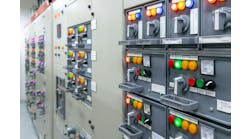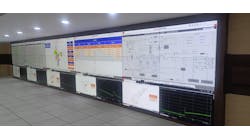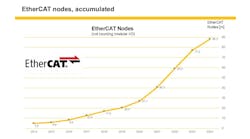Dave Baston, general manager of Control Techniques, a company within Emerson Industrial Automation, recently presented an introduction to its current business developments in the area of PV (photo-voltaic) solar-power, energy-generation systems. Germany has been a major growth market for suppliers of this technology because of government incentives. The logic for introducing it to the UK press was explained in terms of the revised UK government incentives recently issued, offering the highest value 'Feed-In-Tariff' in the EU, index linked and guaranteed for 25 years (which exceeds the standard EU offer of 20 years). So there are now many large PV power plants in the planning stages, particularly in the southern sunny and remote parts of the UK, for example in Devon and Cornwall.
Acquired by Emerson in 1995, Control Techniques is based in Newtown, in Wales—not the first place that it might be expected to find a solar power equipment supplier—the main business to date has been based on the manufacture of industrial variable-speed drives and inverters. Its first SPV solar power utility-scale inverter system, with a 2MVA peak power capability, was installed in Germany in 2007. Over the last 15 months, the total capacity installed has been 200MVA peak, in Germany, Italy, Spain, Czech Republic, Belgium and Greece. The business growth has been rather fast, moving from GBP 0.5 million to 1million to 40 million in the last three years, but production of the inverter modules is still in the UK, with the final mechanical assembly in Romania. This production capacity is being ramped up to 1000MVA per annum, around five times the capacity installed last year, showing the phenomenal outburst of business still projected for supplying products to build solar arrays.
The Control Techniques SPV grid-tie inverter system is constructed using 145kWp, 176kWp and multiple 176kWp parallel connected inverter modules to produce a power rating up to 1760kWp, (kWp is peak power). The system uses a control methodology that enables the modular inverters to switch between standby and active states, only using sufficient modules to match the instantaneous power available from the solar array, which significantly enhances both efficiency and plant availability. The inverters are suitable for all large-scale PV applications, and they are compatible with either thin-film or crystalline PV modules.
Control Techniques has worked with PV panel manufacturers such as Eurener of Spain and Portugal, where it has a panel production capability of 100MW per annum, on several of its investments into turnkey PV power plants in Italy, totalling 15MVA. Another recent project is in California, for Eurus Energy America and NRG Solar, which has a 45MW capacity.
The largest known UK solar power project to date will see the installation by March 2011 of 2200 photovoltaic panels on warehouse roofs in Ipswich, Suffolk, covering an area of 1.1 acres. Designed to generate 500kWp, the panels will be installed by 'Going Solar' from Neen Sollars, Worcestershire, on behalf of a London-based renewable energy developer. Going Solar is a relatively new business, but recently installed solar panels to heat a school swimming pool, with anticipated energy cost savings of GBP10k a year.



